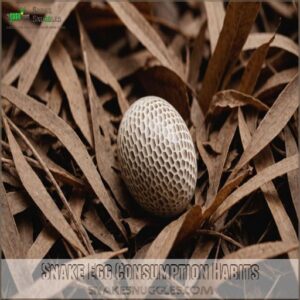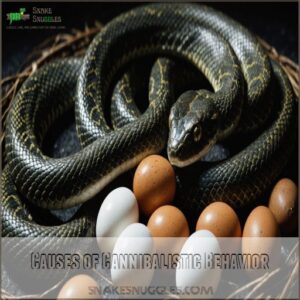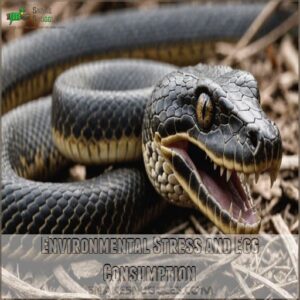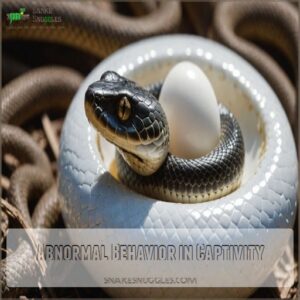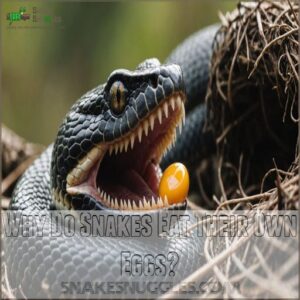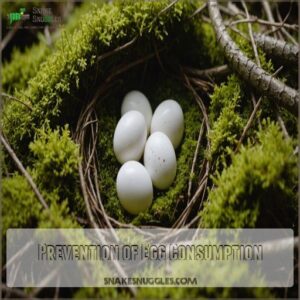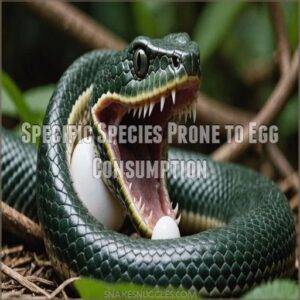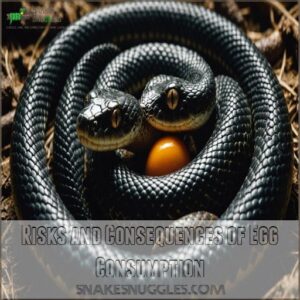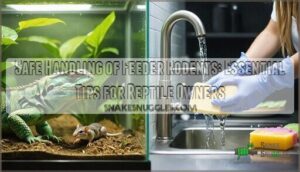This site is supported by our readers. We may earn a commission, at no cost to you, if you purchase through links.
 So, do snakes eat their own eggs?
So, do snakes eat their own eggs?
Well, generally they don’t, as most snakes prioritize survival by ensuring their offspring hatch successfully.
However, there are quirky exceptions.
Sometimes snakes munch on their own eggs if they’re stressed, sick, or cramped in tiny enclosures.
Think of it as a last-ditch recycling effort!
It’s usually a response to environmental stress or confusion, not some strange culinary preference.
In rare cases, they might mistake their eggs for prey.
Ensuring proper conditions can prevent this unusual behavior.
Curious about which snakes might confuse their eggs for a snack?
Stick around for some surprising insights!
Table Of Contents
- Key Takeaways
- Snake Egg Consumption Habits
- Snake Species That Eat Eggs
- Cannibalism and Egg Consumption in Snakes
- Why Do Snakes Eat Their Own Eggs?
- Mother Snakes and Their Babies
- Prevention of Egg Consumption
- Specific Species Prone to Egg Consumption
- Risks and Consequences of Egg Consumption
- Ensuring a Healthy Environment for Snakes
- Frequently Asked Questions (FAQs)
- Why do snakes eat their own eggs?
- Do snakes eat chicken eggs?
- How often do snakes eat eggs?
- Are egg-eating snakes suitable pets?
- What is the Average Size of a Snake Egg?
- How Often Do Snakes Eat Eggs?
- What Should I Feed My Pet Snake Instead of Eggs?
- Do Snake Eggs Need to Be Incubated?
- What Are the Signs of Egg Consumption in Snakes?
- How do snake eggs differ from bird eggs?
- Can snakes digest eggshells effectively?
- What adaptations help snakes eat eggs?
- Are all snake eggs edible to other snakes?
- How do snakes locate and capture eggs?
- Conclusion
Key Takeaways
- You’ll find that snakes generally don’t eat their own eggs, but stress, sickness, or cramped living conditions might lead to this unusual behavior.
- When stressed, snakes might confuse their eggs for prey due to environmental pressures or insufficient feeding, leading to cannibalistic behavior as a survival instinct.
- Certain snake species like rat snakes, kingsnakes, and indigo snakes naturally consume eggs as part of their varied diet, but they still need other nutrients for balanced health.
- Maintaining ideal enclosure conditions with proper temperature, humidity, and space can dramatically reduce stress-related egg eating, keeping both snakes and their eggs safe.
Snake Egg Consumption Habits
You’ll find snakes consuming a variety of eggs in the wild, from bird and reptile eggs to those of amphibians and fish, thanks to their remarkable ability to unhinge their jaws and swallow prey whole.
While many snake species regularly eat eggs as part of their natural diet, you might be surprised to learn that some snakes may even consume their own eggs under specific circumstances like stress or resource scarcity.
Types of Snakes That Eat Eggs
While many snakes eat eggs, some species are better equipped for this diet than others.
Rat snakes, kingsnakes, and indigo snakes frequently raid nests for their meals.
These crafty hunters have evolved specialized jaws and teeth that help them grip and crack shells without making a mess.
You’ll often find them sneaking around bird nests, using their incredible sense of smell to track down their next egg-shaped snack.
Importance of a Balanced Diet
Beyond seeking out different types of eggs, snakes need a varied diet to thrive, especially considering egg-eating snake species.
You find that snakes can’t survive on eggs alone – they’re like us, needing a mix of nutrients to stay healthy.
A balanced diet provides proteins, fats, vitamins, and minerals that keep your snake in top shape.
Think of eggs as more of a snack than a main course in their dietary needs.
Adaptations for Egg Consumption
Snakes have evolved remarkable adaptations for consuming eggs, like their flexible jaws that unhinge to swallow whole eggs.
You’ll be amazed by their specialized features, including:
- Sensitive scales that detect egg vibrations and temperature
- Spinal bones that can crush eggshells inside their throat
- Enhanced digestive systems that efficiently process shell calcium
These adaptations make snakes nature’s perfect egg-eating machines, though they still need a varied diet to thrive.
Snake Species That Eat Eggs
You’ll find several snake species that naturally include eggs in their diet, with some species, like the non-venomous smooth green snakes, primarily consuming insects, and smooth green snakes’ prey. Rat snakes, kingsnakes, and indigo snakes being the most egg-eaters.
These skilled hunters use their flexible jaws to swallow eggs whole, making them nature’s perfect egg-hunting specialists.
Rat Snakes and Their Diet
Throughout the year, rat snakes display remarkable dietary flexibility, adapting their menu based on availability.
You’ll find these resourceful hunters targeting various prey in different environments.
| Habitat | Primary Prey | Secondary Prey |
|---|---|---|
| Forest | Bird eggs | Small mammals |
| Urban | Mouse eggs | Lizard eggs |
| Wetland | Duck eggs | Amphibian eggs |
Their incredible jaw flexibility lets them swallow eggs whole, making them nature’s ultimate egg hunters in their ecosystems.
Kingsnakes and Their Prey
You’ll find kingsnakes at the top of the snake food chain, known for their impressive hunting skills.
Unlike their rat snake cousins, some species are actually known as ophiophagic snakes, these remarkable reptiles don’t just stop at eggs – they’re famous for eating other snakes too!
While they’ll happily feast on bird and reptile eggs, kingsnakes have earned their royal title by taking down venomous serpents like rattlesnakes and copperheads without breaking a sweat.
Indigo Snakes and Their Habitat
Unlike their kingsnake cousins, eastern indigo snakes prefer a warm, humid climate in the southeastern United States.
They’re right at home in pine forests, marshes, and even your backyard if you live in Florida or Georgia.
These gorgeous black-blue giants aren’t picky eaters – they’ll hunt everything from small mammals to bird eggs.
But here’s a fun fact: they’ve got a special taste for other snakes, including venomous ones!
Cannibalism and Egg Consumption in Snakes
You’ll notice that even mother snakes can eat their own eggs when they’re under extreme stress or living in poor conditions.
Under normal circumstances, though, you’ll find that most snake species have strong maternal instincts and will protect their eggs until they hatch, making egg-eating behavior quite rare in the wild.
Causes of Cannibalistic Behavior
Several factors can lead to snakes eating their own eggs.
While maternal instincts typically prevent such actions, certain situations may override these natural programming.
Some experts also point out that understanding the reasons behind this behavior can be important in creating a safe environment for snakes, as seen in products related to snake eat own eggs care.
Here’s what might cause a snake to consume its eggs:
- Illness or injury causing confusion and disorientation
- Extreme hunger due to insufficient feeding schedules
- Confined spaces that don’t allow proper nesting, leading to instinctive responses
Environmental Stress and Egg Consumption
Environmental stress pushes snakes right up against their limits, sometimes leading to unexpected behaviors like egg consumption. Several factors contribute to this survival response:
| Stress Factor | Impact on Snake Behavior |
|---|---|
| Limited Space | Increased aggression |
| Poor Heating | Metabolic disruption |
| Low Humidity | Dehydration stress |
| Food Scarcity | Survival instincts |
| Predator Presence | Fight-or-flight response |
When resources run thin in nature, maternal instincts can take a backseat to survival needs.
Abnormal Behavior in Captivity
Stress isn’t the only factor driving snakes to eat their eggs in captivity.
Your pet snake might display abnormal behaviors if its enclosure feels too cramped or unfamiliar. Just like you’d feel out of sorts in a tiny apartment, snakes need proper space to thrive.
Watch for signs of illness too – a sick snake may not recognize its own eggs, leading to accidental consumption.
Why Do Snakes Eat Their Own Eggs?
You’ll be surprised to learn that snakes sometimes eat their own eggs when they’re stressed, sick, or living in cramped spaces.
If you’ve noticed this behavior in your pet snake, don’t worry – it’s usually caused by environmental factors like incorrect temperature, lack of food, or confusion in captivity.
Stress and Illness
Your snake’s stress levels can trigger unexpected behaviors, including eating their own eggs.
Think of it like stress-eating in humans – when snakes feel overwhelmed by illness or environmental pressures, their natural instincts can go haywire.
Common stressors include incorrect temperatures, loud noises, or frequent handling.
If you notice unusual behavior, it’s important to check your pet’s health and adjust their environment accordingly.
Mistaking Eggs for Food
Snakes can have trouble telling their eggs from regular food, even with their sharp senses.
Think of it like mixing up your lunch with someone else’s in the office fridge!
There are resources available that cover snake egg eating, like those offering chewy snake egg products.
A snake’s natural instincts to hunt and eat can override their parental programming, especially when they’re dealing with previous health issues.
That’s why it’s essential to monitor your snake’s behavior around their eggs.
Confusion and Small Spaces
Living in tight spaces can mess with a snake’s head – literally!
In captivity, limited enclosure size creates confusion about what’s food and what’s not.
When your slithery friend can’t tell their eggs from their next meal, they might end up eating them.
Picture trying to raise kids in a closet – it’s just asking for trouble!
That’s why proper enclosure sizing matters.
Hunger and Lack of Feeding
Beyond the confusion of tight spaces, a hungry snake might turn to desperate measures.
When food’s scarce and feeding schedules are off, maternal instincts can take a backseat to survival.
You’ll notice nutritional deficiencies drive this behavior – it’s like your stomach growling during a long meeting.
Proper dietary changes and maintaining regular food availability prevent these situations, keeping both mom and eggs safe and sound.
Mother Snakes and Their Babies
You’ll find that most mother snakes don’t stick around after laying their eggs, though some species like ball pythons guard their clutches until they hatch.
While it’s rare in nature, you might be surprised to learn that stressed or confused mother snakes in captivity sometimes eat their own eggs when their environment isn’t quite right.
Do Mother Snakes Eat Their Babies?
While many reptiles show little concern for their offspring, mother snakes rarely eat their babies in the wild.
You’ll find this behavior mostly in stressed captive situations.
In fact, some species like ball pythons are devoted parents, coiling around their eggs until they hatch.
However, certain snake species, particularly kingsnakes, might eat their young if kept together in cramped spaces.
Maternal Care in Snakes
Some species, like African rock pythons, protect their young for about two weeks after emergence, and snake moms show remarkable maternal care regarding their eggs.
During incubation, they’ll coil around their clutch, maintaining the perfect temperature through gentle muscle movements.
You might be surprised to learn that some species, like ball pythons, won’t eat for weeks while brooding.
They’ll even adjust their position to guarantee each egg gets the right amount of warmth, showcasing nature’s incredible nesting instincts at work.
Protective Instincts in Female Snakes
Female snakes showcase remarkable protective instincts when guarding their eggs.
You’ll find them coiling around their clutch, maintaining ideal temperature and humidity.
They’ll even skip meals for weeks to keep their eggs safe, proving that maternal care runs deep in these remarkable reptiles.
- A python mom’s muscles ‘shiver’ to warm her eggs, raising the temperature by up to 7°F
- Ball pythons defend their nests fiercely, striking at anything that comes too close
- Indian pythons stay with their eggs for up to 72 days without eating
Prevention of Egg Consumption
You’ll need to act quickly to save your snake‘s eggs by removing them right after they’re laid, since even caring mothers can eat their own eggs when stressed.
While you’re keeping those eggs safe, you’ll want to check your snake’s living space to make sure it’s got the right temperature, humidity, and enough room to feel comfortable.
Removing Eggs Promptly
During the important egg-laying period, you’ll need to act fast to protect both mother and clutch, as some species like the Eastern Milk Snake lay 5-20 eggs in June and employ temperature-dependent sex determination learn more about Eastern Milk Snake eggs.
Here’s a detailed guide for successful egg removal:
| Time Window | Action Required | Risk Level |
|---|---|---|
| 0-2 hours | Minimal handling | Very Low |
| 2-6 hours | Quick removal | Low |
| 6-12 hours | Careful monitoring | Moderate |
| 12-24 hours | Urgent action | High |
| 24+ hours | Critical situation | Very High |
Remember to use sanitized tools and maintain proper temperature during the removal process.
Improving Enclosure Conditions
Four key factors influence whether your snake might snack on its own eggs.
To create the best enclosure conditions and prevent egg consumption:
- Maintain precise temperature gradients between 75-85°F using quality thermostats
- Keep humidity levels steady at 50-70% with proper ventilation
- Provide deep, moisture-retaining substrate like coconut husk
- Provide ample space – at least 1.5 times the snake’s length in width and height
These improvements dramatically reduce stress-related egg eating.
Monitoring Snake’s Health
Regular health checks can spot problems before your snake starts eyeing those eggs.
Watch for these key signs:
| Health Indicator | What to Monitor |
|---|---|
| Weight | Weekly measurements using a snake weight scale can help track changes |
| Shedding | Complete vs partial shed |
| Appetite | Food acceptance rate |
| Droppings | Color and consistency |
| Behavior | Activity level changes |
Keep a log of these signs – it’s like giving your snake a regular check-up without the hassle of vet visits.
Spot issues early, and you’ll keep egg-eating behaviors at bay.
Specific Species Prone to Egg Consumption
You’ll find that certain snake species, like African egg-eating snakes and Indian egg-eaters, have specially adapted jaws and digestive systems that make them natural egg specialists.
While these snakes typically target bird and reptile eggs in the wild, they can occasionally consume their own eggs when faced with extreme stress or limited food options in captivity.
African Egg-Eating Snakes
African egg-eating snakes are nature’s specialized egg hunters, using their incredible flexible jaws to swallow eggs whole.
You’ll find these remarkable creatures throughout sub-Saharan Africa, where they’ve mastered the art of climbing trees to raid bird nests.
Unlike other snakes, they’ve evolved unique vertebrae that crack eggs internally, allowing them to digest the contents while regurgitating the intact shells.
Talk about efficient dining!
Indian Egg-Eater Snakes
Like their distant cousins, Indian egg-eater snakes showcase remarkable feeding habits.
These specialized reptiles have unique adaptations that set them apart:
- Their spine has specialized vertebrae for crushing eggs
- They can swallow eggs three times wider than their head
- Special muscles help extract nutrients while discarding shells
- Their metabolism allows them to survive on eggs alone
You’ll find these fascinating creatures throughout South Asia, where they’ve perfected their egg-hunting craft over millions of years.
Other Species Under Specific Circumstances
Beyond specialized egg-eaters, you’ll find various snake species that might consume eggs under specific conditions.
Ball pythons, normally gentle mothers, typically don’t eat eggs due to their heat pits and mouth structure optimized for live prey, but under specific feeding schedules, they can eat their eggs if severely stressed or malnourished.
Corn snakes and king cobras occasionally snack on eggs when their usual prey (like lizards, birds, or amphibians) is scarce.
Even some water snakes have been spotted raiding turtle nests when the opportunity presents itself.
Risks and Consequences of Egg Consumption
You’ll find it fascinating that when snakes consume their own eggs, they risk serious health issues like malnutrition and digestive problems that can affect their overall wellbeing.
Some snakes have been known to exhibit ovoviviparous behavior, developing eggs inside the mother, and this unique reproductive strategy can influence their maternal instincts and eating habits. Egg consumption can greatly impact a pregnant snake’s reproductive success and reduce the chances of successful breeding in the future.
If you’re caring for a pregnant snake, it’s important to understand that egg consumption can greatly impact their reproductive success and reduce the chances of successful breeding in the future.
Health Risks for Snakes
Many snakes face serious health risks when consuming their own eggs. While it might seem like an easy meal, this behavior can lead to several complications.
The unique adaptations that allow snakes to eat eggs, such as specialized vertebrae for egg crushing, can sometimes work against them in regard to their own eggs.
- Bacterial infections from eggshell fragments scratching the digestive tract
- Severe digestive issues due to calcium overload
- Risk of impaction if shells aren’t properly digested
- Exposure to harmful bacteria that naturally exist on eggshells
You’ll want to monitor your snake closely if you suspect egg consumption.
Impact on Reproduction
Eating their own eggs might seem bizarre, but for snakes, it’s a wildcard in reproductive success.
Egg consumption impacts clutch size and reduces hatching rates, putting a dent in survival rates.
Imagine a snake’s eggs as its lottery tickets; fewer tickets mean fewer chances to win the survival game.
| Factor | Effect on Reproduction | Description |
|---|---|---|
| Egg Consumption | Decreased Clutch Size | Leads to fewer viable eggs |
| Hatching Rates | Reduced | Lower chances for offspring |
| Survival Rates | At Risk | Limited opportunities for survival |
Potential for Malnutrition
Reduced reproductive success isn’t the only problem; an egg-only diet can lead to malnutrition.
Think of it like this: your snake needs a varied menu!
Here’s what can happen:
- Nutritional deficiencies.
- Growth stunting.
- Long-term health problems.
- Even death.
A balanced diet is key for a happy, healthy snake. Don’t let your slithery friend go hungry!
Ensuring a Healthy Environment for Snakes
To make sure a healthy environment for your snake, it’s important to provide proper care, nutrition, and a stress-free habitat.
You might find it amusing, but even snakes appreciate a comfortable home where they don’t confuse their eggs for breakfast!
Providing Proper Care and Nutrition
You’re making sure your snake has a cozy setup.
Think enclosure size—just right to stretch but not get lost.
Keep up with their dietary needs; mixing proteins keeps things exciting and nutritive.
Don’t skip on feeding frequency or forget calcium supplementation to dodge vitamin deficiencies.
It’s like serving up a balanced buffet, ensuring your slithering friend is happy, healthy, and thriving.
Minimizing Stress and Anxiety
Proper care involves more than just diet.
Stress can creep up on snakes if their environment lacks enrichment or appropriate social interaction.
Think of it like a snake spa day—gentle handling techniques and regular care checks can help maintain a snake’s zen.
Meeting their nutritional needs consistently also keeps reptilian tantrums at bay.
Remember, calm snakes are happier snakes, slithering through life smoothly.
Creating a Suitable Habitat
Setting up a cozy habitat for your snake isn’t just about throwing things together. Think of it as creating a mini-resort! Keep the temperature warm without turning it into a sauna. Maintain humidity to mimic their natural vibes. Give them space to stretch out and feel at home. Choose a comfy substrate. Don’t forget enrichment—toys and hideaways keep them happily occupied!
- Maintain ideal temperatures
- Maintain proper humidity levels
- Provide ample space
- Choose a cozy substrate
- Offer enrichment options
Frequently Asked Questions (FAQs)
Why do snakes eat their own eggs?
Sometimes, stressed or hungry snakes might eat their eggs. It’s a survival instinct, not a normal behavior. Lack of resources or unsuitable environments can trigger this.
Do snakes eat chicken eggs?
Yes, some snakes, like rat snakes and kingsnakes, will eat chicken eggs if available.
They use their flexible jaws to swallow them whole,
making these eggs an easy, nutritious snack in their opportunistic diets.
How often do snakes eat eggs?
Snakes eat eggs opportunistically, depending on availability and species diet preferences.
Egg-eating snakes, like rat snakes or kingsnakes, may hunt eggs frequently.
However, they can’t rely solely on eggs, needing a varied diet for balanced nutrition.
Are egg-eating snakes suitable pets?
Imagine having a pet that’s both fascinating and low-maintenance.
Egg-eating snakes can fit the bill.
They’re intriguing to watch, don’t require live prey, and are generally easy to care for with proper conditions.
What is the Average Size of a Snake Egg?
Snake eggs typically range from one to five inches in length, varying among species.
Most are soft-shelled, resembling leathery tablets.
Picture a ping pong ball, but squishier!
Some species of snakes, like viviparous certain snakes with live babies, give birth to live young, a process that’s both beneficial and surprising. It’s nature’s way of giving snake babies a flexible start.
How Often Do Snakes Eat Eggs?
You’re strolling through the wild, and suddenly, you wonder about egg-eating habits among snakes.
These opportunists don’t stick to a strict schedule; they munch on eggs when available, adding them sporadically to their varied diet.
What Should I Feed My Pet Snake Instead of Eggs?
It’s essential to choose the right prey for your pet snake, considering the risks of feeding wild mice, which can carry parasites and diseases, opt for pre-killed prey for a safer and more balanced diet learn more about safe snake prey. Feed your pet snake mice, rats, or specially formulated snake food.
These options provide balanced nutrition.
Swap sizes depending on your snake’s age and species.
Fresh water is essential, and handle all food safely to prevent disease.
Do Snake Eggs Need to Be Incubated?
Unlike some reptiles, most snakes abandon their eggs. Incubation’s a vital step; temperature and humidity are key for successful hatching. So, yes, they need incubation, but not from mama snake!
What Are the Signs of Egg Consumption in Snakes?
If your snake eats eggs, you might see fewer eggs in the enclosure than expected.
Watch for signs of fullness, like a noticeable bulge in the snake’s belly, and unusual behavior such as excessive restlessness or hiding.
How do snake eggs differ from bird eggs?
Snake eggs feel leathery and flexible, easily adapting to their environment.
Snake eggs are flexible and adaptable, while bird eggs are hard and brittle.
Bird eggs are hard and brittle to protect from falls.
Stick with subtle texture and resilience differences; it’s like comparing a plush cushion to a brittle vase.
Can snakes digest eggshells effectively?
Snakes can break and consume eggshells, thanks to specialized structures in their necks that crush the shells.
However, while they can digest the contents, the shells mostly pass through their digestive system undigested.
What adaptations help snakes eat eggs?
You might find snakes’ adaptations for egg consumption fascinating: they use flexible skulls, unhinged jaws, and sharp olfactory senses to swallow eggs whole.
They’re like nature’s Houdini, slipping eggs down smoothly without breaking them.
Are all snake eggs edible to other snakes?
Not all snake eggs are edible to other snakes.
While some snakes might consume eggs from various species, including their own, others avoid it due to nutritional needs or the particular toxins that certain eggs might contain.
How do snakes locate and capture eggs?
Many snakes use their keen sense of smell to find eggs. They might also spot them visually or feel vibrations from nearby nests. Once located, they swallow the eggs whole.
Conclusion
The universe of snakes is full of surprises, and the question "do snakes eat their own eggs?" is one such mystery.
While it’s mostly an odd quirk brought on by stress, small spaces, or confusion, with some species prone to this behavior, you can prevent it by maintaining healthy conditions and stress-free environments for your slithery friends.
By staying informed and attentive, you can make sure that your snakes live their best, most natural lives, without unexpected egg-eating episodes.

